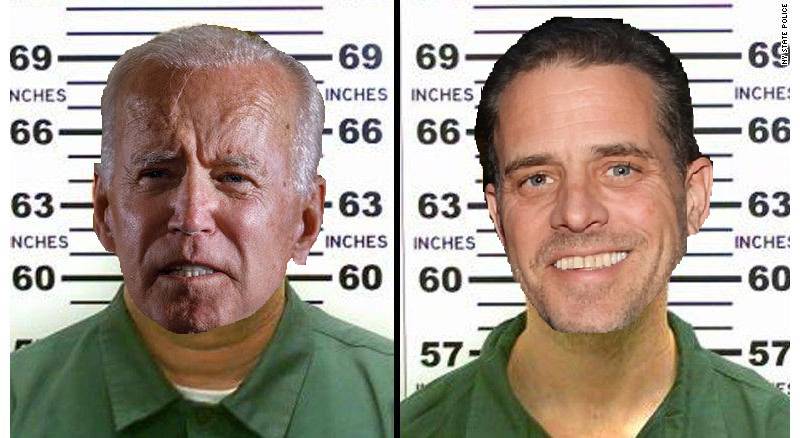One thing that irks me to no end is the statement in virtually all mainstream media stories referencing Hunter Biden that, “There is no evidence of wrongdoing by the Bidens.” For example, here it is in a WSJ story today:
“Mr. Trump and his allies have questioned Hunter Biden’s board role at a Ukrainian gas company. Mr. Trump has called the Bidens’ activities corrupt. There is no evidence of wrongdoing by the Bidens.”
It would be one thing if the statement were that there was no proof that the Bidens committed a crime. But the statement that there is no evidence of wrongdoing is ludicrous. There is no dispute about the fact that Hunter Biden, without qualifications, was given a position on the Burisma board with extraordinarily high compensation at the time when his father was our VP and had recently become the point man for US relations with Ukraine. There is plenty of evidence of this.
So, the statement boils down to the position that there is certainly nothing wrong, which means legally or morally, about this relationship. But, whether or not it is illegal, there can be little question that Congress and the Courts consider such arrangements to be wrong.
Just look to the Foreign Corrupt Practices Act of 1977 (FCPA) and the case law surrounding it. The FCPA, among other provisions, makes it illegal for most US public companies who engage in:
… the giving of anything of value to–
(1) any foreign official for purposes of–
(A) (i) influencing any act or decision of such foreign official in his official capacity, (ii) inducing such foreign official to do or omit to do any act in violation of the lawful duty of such official, or (iii) securing any improper advantage; or
(B) inducing such foreign official to use his influence with a foreign government or instrumentality thereof to affect or influence any act or decision of such government or instrumentality,
in order to assist such issuer in obtaining or retaining business for or with, or directing business to, any person;
The question arises as to whether this prohibition extends to relatives of public officials. A 2014 Reuters story reported that the SEC initiated examinations of at least five US and European banks to determine whether anti-bribery laws were violated by hiring relatives of well-connected foreign officials. According to a 2016 blog post concerning FCPA investigations of hiring practices of US companies in China by Matthew Stephenson, Harvard Law School’s Eli Goldston Professor of Law and editor in chief of the Global Anticorruption Blog:
These investigations raised an interesting legal question: Can providing a job or internship to the adult relative of a foreign official ever count as providing “anything of value” to the official him- or herself? To my mind, the answer is a clear yes, but not everyone agrees. Last year, Professor Andy Spalding and I engaged in a spirited and constructive debate on this question (see here, here, here, and here)—and though I think in the end our positions (mostly) converged, there was perhaps still some lingering doubt (though not in my mind) as to whether the U.S. government would or should adopt the view that offering a bribe to an official’s relative can count as offering something of value to the official.
That doubt has been laid to rest. In the BNY Mellon settlement from last August, the settlement document explicitly endorsed the view that the firm’s decision to provide internships to foreign officials’ relatives counted as providing “anything of value,” because “[t]he internships were valuable work experience, and the requesting family members derived significant personal value in being able to confer this benefit on their family members.” And last week, the SEC announced a settlement with Qualcomm regarding investigations into Qualcomm’s alleged FCPA violations in China; although the violations included more traditional bribes (such as lavish gifts, travel, and entertainment), the settlement focuses substantially on Qualcomm’s practice of hiring the relatives of Chinese officials (and executives at state-owned enterprises, who count as foreign officials for FCPA purposes) in exchange for favorable treatment—even when these candidates would not meet Qualcomm’s normal hiring standards.
The Ukrainian company that brought Hunter Biden onto its Board is outside the jurisdiction of the FCPA, and it is not clear whether the purpose of bringing on Biden was aimed at obtaining or retaining business. But regardless of whether the activity meets the letter of the FCPA, the lavish compensation of an individual without any evident qualification beyond being the son of the US Vice President responsible for Ukrainian affairs, is certainly analogous to the type of wrongdoing — labeled corruption — that is prohibited under US law. While there may not be evidence of criminality (and I am not familiar with all the laws that may come into play), any media story that claims there is no evidence of wrongdoing in the Biden’s relationship with Burisma and Ukraine is averting its eyes from what is in plain site.
I think there may be legal issues here that are worth exploring by someone equipped to do so, but it also occurs to me that I’ve not heard a single ethicist weigh in on what appears to be something that would be widely acknowledged in our society as wrongdoing, even it might not qualify as criminality. Have I just missed all these experts?










